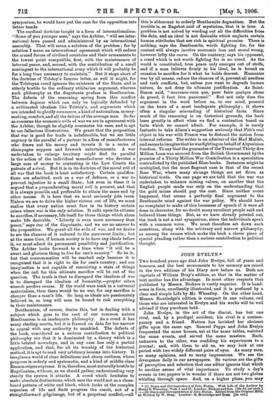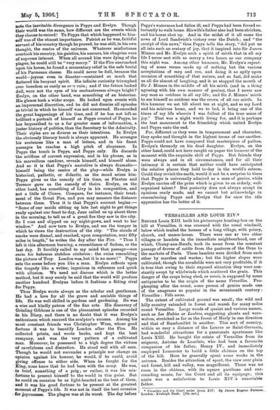JOHN EVELYN.* Two hundred years ago died John Evelyn, full
of years and honours, and the best monuments to his memory are raised in the two editions of his Diary now before us. Both are reprints of William Bray's edition, so that in the matter of text neither has the advantage. In most other respects that published by Messrs. Bickers is vastly superior. It is hand- some in form, excellently illustrated, and it is prefaced by a clear and simple Life by Mr. Wheatley. On the other hand, Messrs. Routledge's edition is compact in one volume, and those who are interested in Evelyn and his works will be well advised if they purchase both.
John Evelyn, in the art of the diarist, has but one rival, and, by a prodigal accident, his rival is a contem- porary and a friend. Nature has lavished her choicest gifts upon the same age. Samuel Pepys and John Evelyn frequented the same houses, sat at the same tables, watched the same events, and served the same masters. Each, unknown to the other, was confiding his experiences to a journal ; and, with them to aid us, we may look at one period with two widely different pairs of eyes. As many men, so many opinions, and so many impressions. We see the divergence daily in our newspapers. So various are the gifts of perception and selection that one editor ignores that which to another seems of vital importance. To study a day's events in two papers is to wonder if there are not two globes whirling through space. And, on a higher plane, you may * (1) Diary and Correspondence of John Braun. With Life of the Author by Henry B. Wheatley. Vols. L and IL Loudon Bickers ituol Son. [Ws. 6d. net each.] —(2) Diary and Correspondence of John Evelyn. Edited from the Original MSS. at Wotton by W. Bray. London : G. Boutledge and Bons. [53, not.] note the inevitable divergence in Pepys and Evelyn. Though their world was the same, how different are the events which they choose to record ! To Pepys that which happened to him- self was of the utmost importance. Patriot as he was, faithful servant of his country though he proved, he was still, in his own thought, the centre of the universe. Whatever misfortunes overtook his country, his gaieties, his amours, his chagrins were of supreme interest. When all around him were dying of the plague, he could still be "very merry." If the Fire encroached upon his house, he found a momentary relief in the safe burial of his Parmesan cheese. He could never be dull, because the world—joyous even in disaster—contained so much that flattered his buoyant spirit. His infinite curiosity triumphed over boredom as easily as ov-T ruin ; and if the future looked dull, were not the eyes of his enchantresses always bright ? Evelyn, on the other hand, was something of an historian. His glance took a wider scope. He looked upon events with an impersonal discretion, and he did not dismiss all episodes as trivial in which he himself was not concerned. He recorded the great happenings of his time, and if he has not left so brilliant a portrait of himself as Pepys created of Pepys, he has bequeathed to us a far greater mass of information, a juster history of politics, than the Secretary to the Admiralty. Their styles are as diverse as their intentions. In Evelyn the obviously literary touch is always apparent. He arranges his sentences Ilike a man of letters, and in his finest passages he reaches a high pitch of eloquence. In Pepys the touch is Pepys, and Pepys only. He discards the artifices of correct expression, and in his phrase, as in his marvellous candour, reveals himself, and himself alone. And so it is that Pepys's narrative is always dramatic— himself being the centre of the play—while Evelyn is historical, pathetic, or didactic, as the mood seizes him. Pepys gives us the comedy of his time, as Plautus and Terence gave us the comedy of theirs. Evelyn, on the other hand, has something of Livy in his composition, and not a little of Cicero. Compare, for instance, their treat- ment of the Great Fire, and you may measure the distance between them. Thus it is that Pepys's account begins :— " Some of our maids sitting up late last night to get things ready against our feast to-day, Jane called us up about three in the morning, to tell us of a great fire they saw in the city. So I rose and slipped on my night-gown, and went to her window." And now turn to Evelyn, and see the temper in which he views the destruction of the city. "The clouds of smoke were dismal, and reached, upon computation, near fifty miles in length," he writes the day after the Fire. "Thus I left it this afternoon burning, a resemblance of Sodom, or the last day. It forcibly called to my mind that passage—non enint hic habemus stabilent civitatem : the ruins resembling the picture of Troy. London was, but it is no more!" Pepys sets the scene before you like a man. Evelyn reflects upon the tragedy like a writer, ingenious in reference and quick with allusion. We need not discuss which is the better method, but it may surely be said that the world will produce another hundred Evelyns before it fashions a fitting rival for Pepys.
Thus Evelyn wrote always as the scholar and gentleman. He had a love for all the grave and amiable things of life. He was well skilled in gardens and gardening. He was wise and kindly patron of the fine arts. His discovery of Grinling Gibbons is one of the pleasantest episodes recorded in his Diary, and there is no doubt that it was Evelyn's .enthusiasm which ensured the sculptor's success. Among his most constant friends was Christopher Wren, whose good fortune it was to beautify London after the Fire. He collected prints, and wrote books, and kept the best company, and was the very pattern of a cultivated man. Moreover, he possessed to a high degree the virtues -of carefulness and discretion. He stood well with all men. Though he would not surrender a principle nor change an opinion against his honour, he would, if he could, avoid giving offence to either side. When be fought for the King, none knew that he had been with the army. He was, - in brief, something of a prig ; or rather, it was his mis- fortune to present himself to the world in this guise. But he could on occasion be as light-hearted as the best of them, and it was his good fortune to be present at the greatest moment of Pepys's life. It was not in itself the best occasion for joyousness. The plague was at its worst. The day before Pepys's waterman had fallen ill, and Pepys had been forced re- luctantly to walk home. His wife's father also bad been stricken, and his house shut up. And in the midst of it all came the news of Lord Sandwich's victory over the Dutch ; and "the receipt of this news," thus Pepys tells the story, "did put us all into such an ecstasy of joy, that it inspired into Sir James Minnes and Mr. Evelyn such a spirit of mirth that in all my life I never met with so merry a two hours as our company this night was. Among other humours, Mr. Evelyn's repeat- ing of some verses made up of nothing but the various acceptations of may and can, and doing it so aptly upon occasion of something of that nature, and so fast, did make us all die almost of laughing, and it so stopped the mouth of Sir J. Minnes in the middle of all his mirth (and in a thing agreeing with his own manner of genius), that I never saw any man so outdone in all my life; and Sir J. Minnes' mirth to see himself so outdone was the crown of all our mirth. In this humour we sat till about ten at night, and so my Lord and his mistress home, and we to bed, it being one of the times of my life wherein I was fullest of the true sense of joy." That was a night worth living for, and it is perhaps the best monument to the friendship which united Evelyn and Pepys unto the end.
For, different as they were in temperament and character, they spoke and thought in the highest terms of one another. Pepys could not have composed that masterpiece of pathos, Evelyn's threnody on his dead daughter. Evelyn, on the other hand, could not have caught on paper the humour of the moment with the exquisite skill of Pepys. But friends they were always and in all circumstances, and for all their intimacy it is certain that neither could have anticipated the relative places they hold to-day in the world's esteem. Could they revisit the earth, would it not be a surprise to them that Pepys is universally admired as a man of genius, while Evelyn carries off the prize which is given to an orderly, well- organised talent ? But posterity does not always accept its opinions ready made, and we cannot but acknowledge in remembering Pepys and Evelyn that for once the idle apprentice has the better of it.









































 Previous page
Previous page